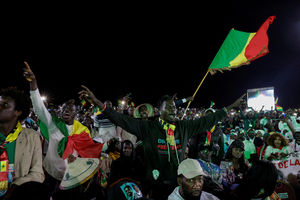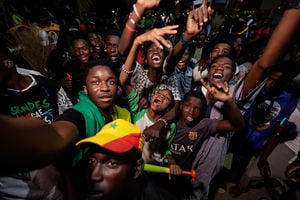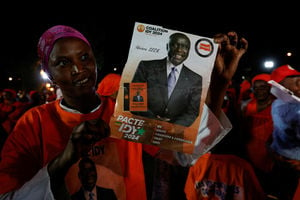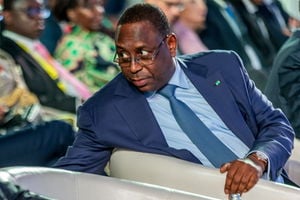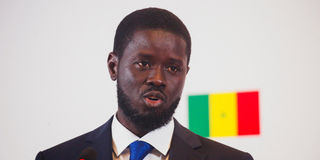
Senegal's president-elect Bassirou Diomaye Faye speaks during a press conference in Dakar, Senegal March 25, 2024.
In his first speech after his surprise landslide victory, Senegal's new president, Bassirou Diomaye Faye, pledged to keep his party's pre-election promises.
High on the list of promises in his campaign manifesto, dubbed 'Project Senegal', are the fight against corruption, the creation of job opportunities for young people and a significant reduction in the cost of living, a major concern for the majority of Senegal's 17 million people.
Diomaye, as he is popularly known, also promises to review oil and gas mining agreements.
But an even more sensitive issue surrounding the new president is his promise to review relations with the former colonial master - France.
His party, the African Patriots of Senegal for Work, Ethics and Fraternity, or PASTEF, has said it wants to end the country's membership of the 14-nation West African Monetary Union, which is pegged to the Euro and which many Senegalese believe has allowed France to control their former colony since independence.
PASTEF was led by Ousmane Sonko, who, like Faye, was in prison until two weeks ago. Sonko emerged from jail and publicly endorsed Faye, giving him a huge boost in popularity. As a result, some say that Faye's victory is largely due to Sonko, who has harboured presidential ambitions himself. In this election, Sonko had been excluded from the ballot as he struggled with legal issues, including a previous allegation of sexual violence.
Much of the debate before and during the election, however, focused on the French connection, in line with strong anti-French sentiment, fuelled in part by events in neighbouring countries where the military has seized power in the face of growing insecurity in the region. Senegal was the odd man out among the former French colonies, having never experienced a coup since independence.
But for many young Senegalese, the outcome of the election marks the true independence of their country. And by that, they mean being able to determine their own destiny from now on.
President-elect Faye, 44, is expected to be sworn in on April 2, the day the term of outgoing President Macky Sall officially ends.
In an address to the media on Monday evening after his victory became clear, he said that for the Senegalese people, his election represented a choice to break with the past in order to give substance to the immense hope generated by the plans of his movement that led to his election.
The declaration was as much an assurance to the Senegalese people as it was to the West African country's development partners.
"I pledge to govern with humility and transparency and to fight corruption at all levels," Diomaye said in the speech, adding: "I pledge to devote myself fully to rebuilding our institutions."
To achieve all this, the new president will have to step on some toes. And the challenge is that many of those toes belong to people outside his party who supported his bid for the presidency. They include political parties that simply wanted to see the back of outgoing President Macky Sall's Alliance pour la République (APR) party.
A notable one is Karim Wade's Senegalese Democratic Party (PDS), which threw its support behind Diomaye in the final minutes of the election.
Wade has a bad reputation for accountability during the 12-year rule of his father, Abdoulaye Wade, the founder of the PDS.
A lawyer by training, Diomaye graduated from Senegal's National School of Administration in 2004 and became a tax inspector. It was there that he met his political mentor, Ousamane Sonko, who had made a name for himself among Senegalese youth by taking a tough stance against corruption in the tax administration.
Diomaye later joined PASTEF, which Sonko founded and led. He would eventually become the party's secretary-general in 2021.

Supporters of Senegalese presidential candidate Bassirou Diomaye Faye celebrate early results showing that Faye is leading initial presidential election tallies, in Dakar, Senegal, March 24, 2024.
PASTEF was at the centre of much of the political unrest that marred Sall's second term as president from 2019, as their anti-establishment stance galvanised Senegal's largely youthful population.
This led to their imprisonment for separate offences.
The election came after months of unrest sparked by Sall's decision to postpone it. The original date was 25 February.
The publication of the list of candidates sparked allegations of corruption within the Constitutional Council, prompting Sall's move, which he claimed was necessitated by his desire to avoid a post-election crisis.
But his decision ended up creating the crisis he claimed he wanted to avoid.
Dozens of people have been killed and dozens of activists arrested and imprisoned, including Diomaye and Sonko.
When Sonko was dropped from the list of candidate for the election, PASTEF, which has since been outlawed, selected Diomaye as Plan B.
A lot of the credit of his victory in last weekend’s election goes to Sonko, who campaigned vigorously for his protégé.
A lot of the views expressed by Diomaye are believed to have emanated from Sonko.
Concerns therefore abound about the potential of the two men to fall apart, given the influence of Sonko.
In his address on Monday, Diomaye paid tribute to Sonko, but he made no mention of his role in the new government, something everyone in Senegal appears eager to hear about.
The new president also spoke about rebuilding “our institutions,” echoing Sall’s APR’s slogan, which was a statement promising to place the motherland before the party interest. To many Senegalese, the outgoing president went against that slogan of his.
But Diomaye seems intent on being true to his words, at least for now. Reports on Tuesday indicated that he had resigned his positions in all bodies within PASTEF. His stepping aside from its decision-making bodies augurs well for pro-democracy and accountability campaigners who see it as much needed separation of party from the state machinery.
If he keeps his word, it would mean ridding the financial registers of all political party activists and other vested interests.
Sall was accused by his critics of reneging on his promise to fight corruption and the impunity from which certain people close to his regime benefited. Therefore, some Senegalese are concerned that Diomaye’s declaration of reconciliation in his speech should not be a sorting-out exercise that only creates sacred cows.
As for his relations with Sonko, it is certain to suffer if he goes against what the political God-father has espoused all these years.
And Diomaye’s resignation as top executive of the party, is a sign of how serious he intends to be a president of his own.

